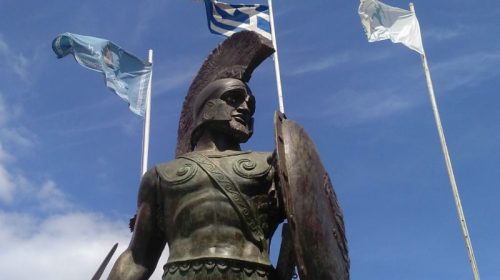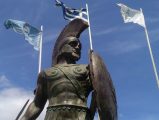Internationally renowned figures to take part in 2020
The legendary last stand of the ancients Spartans saw than 5,000 Greek warriors comprising approximately 300 Spartans, 80 Mycenaeans, 500 Tegeans, and 700 Thespians, led by Leonidas, meet the Persians at Thermopylae in central Greece.
The Municipality of Sparta is planning to hold a series of events in 2020 to celebrate the 2,500-year anniversary of the legendary last stand of the 300 Spartans at the Battle at Thermopylae against the mighty Persian Empire in 480BC.
Mayor of Sparta Petros Doukas explained his local council’s ambitious plans in an interview with the Athens-Macedonian News Agency.
He said the aim was to honour the Spartans while promoting the region touristically. With this goal in mind the Mayor said an international honourary committee consisting of renowned personalities, who agreed to voluntarily contribute to the events out of their shared love for the proud Spartan history, had been set up.
“They will aid us with their global prestige, their knowledge and their international relations and networking in organising events truly worthy of Sparta, Leonidas and the 300” he said.
According to Mr. Doukas, this committee includes, among others, Aziz Syriani, president of the Olayan Group, Spyros Capralos president of the Greek Olympic Committee, the great Greek expatriate George Sakellaris, the Duke of Kent, George, the former prime minister of Pakistan, Shaukat Aziz, famous Cambridge historian Paul Cartledge, Bettany Hughes, historian, author and historian of documentary history, and Chrysanthi Gallou, Professor of Archeology at Nottingham University.
As Mr. Doukas told the Athens-Macedonian News Agency: “Sparta, the 300, Leonidas and the Battle of Thermopylae are unique and huge global brand names, so we must utilise them, both as a homage to our ancestors and for the promotion of the country”.
The plan is to organise a series of festivals, events and competitions in poetry, dance, music, gymnastics, martial arts, Spartan cuisine and children’s theatre. A small Apella (an ancient Spartan assembly of citizens) is also planned, where a large lounge will be set up in Sparta Square, where an array of topics on philosophy, history, cosmology, medicine, theatre, arts, poetry, geopolitics, etc. will be discussed with the high-profile guests.
Global events beyond the borders of Sparta are also planned, such as the East-West Forum, a conference of NATO member states’ ministers, as well as a large rural symposium with an emphasis on women’s rural entrepreneurship.
As part of an international sister-city network, the establishment of relations between the five major ancient Greek cities (Sparti-Argos-Corinth-Athens-Thebes) and their immediate corresponding ancient colonies (Sparti-Taras-Heraklia-Thira) are planned.
In addition, a plan is in the works to set up a Doric Cultural Network, of which Sparta was the metropolis, namely Dodoni-Doris-Sparta-Argos-Corinth-Sikyon-Megara-Epidaurus-Aegina-Messina-Doric Cyclades-Doric Hexapolis-Rhodes-Alikos -Lindos-Ialyssos-Kamiros-Doric Crete (Gortys, Lyttos) and Doric Great Greece (Syracuse, etc.)
The ambitious plans also include the creation of ties between the most important cities of the Classical period, Sparta-Athens-Rome-Alexandria-Babylon-Syracuse-Carthage-Cairo-Jerusalem-Tire-Sidon.
According to the mayor, international symposiums will be organised, which will focus, among other things, on the constitution of Lycurgus, the Battle of Thermopylae, women of Sparta, the significance of Doric Culture, the Peloponnesian War, the so-called “The Thucydides Trap”, as well as the themes: “Sparta and Japan”, “Sparta and Egypt” and “Sparta and Israel”.





















